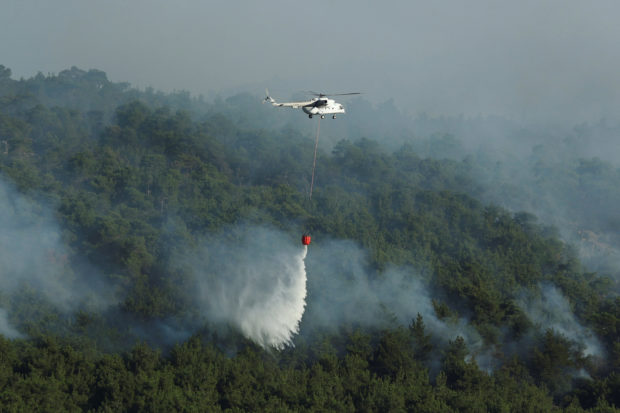EU plans to build firefighting fleet faster after summer of climate crises

A firefighting helicopter makes a water drop, as a wildfire burns in the Dadia National Park, in the region of Evros, Greece, July 26, 2022. REUTERS FILE PHOTO
BRUSSELS — The European Union and its member states agreed on Monday to speed up plans to establish an EU fleet of firefighting aircraft, after rampaging wildfires across Europe this summer exhausted the bloc’s capacity to respond.
This summer’s wildfires forced thousands of Europeans to evacuate, and razed homes and businesses, part of a worsening trend as climate change increases the hot and dry conditions that help fires spread, burn longer and rage more intensely.
Southern European countries such as Portugal and Greece experience fires most summers, but Germany and the Czech Republic also suffered large blazes this year, as hotter temperatures push fire risk north and into countries less equipped to cope.
At a meeting on Monday, the European Commission and ministers from EU countries agreed to explore an advanced purchase of EU-funded helicopters, the EU’s head of crisis management, Janez Lenarcic, said in a statement.
“At European level, we have reached our capacity limit. Some overwhelming fires in some member states did in fact not lead to a request for assistance because the countries concerned… knew that no capacities would have been available,” Lenarcic told the meeting.
The helicopter purchase will depend on extra EU funds being agreed in the bloc’s 2023 budget – a potentially challenging ask, as EU countries scramble for money to support industries and citizens hit by soaring inflation, and invest in energy infrastructure to wrest free from Russian gas.
The EU had already planned to procure a fleet of crisis-response aircraft to cope with increasing climate-fueled emergencies, but production was not expected until the second half of the decade.
The EU’s emergency resources currently involve coordinating and funding the deployment of 12 firefighting airplanes and a helicopter pooled by EU countries.
EU countries are responsible for responding to forest fires, and request EU assistance only when they need back-up. The bloc received 11 requests for assistance this year, up from nine in 2021.
RELATED STORIES
2022 sees record Europe wildfire destruction—EU